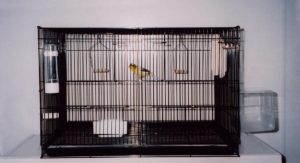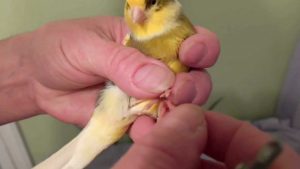Canaries are an extremely popular pet bird. Because they are one of the first companion pet birds, canaries have been admired and loved because of their gorgeous songs and easy care. Canaries are excellent, friendly birds that would be a great addition to any home and a wonderful choice for first time bird owners.
History
Not surprisingly, canaries originated from a Spanish island group called the Canary Islands. What is odd, however, is that the island was named using the Latin word Canis, referring to a species of dog that was bred on these islands. It wasn’t until the Spanish had rule over the islands in the 1400’s that they started to pay attention the islands’ native birds and developed the name, “Canaries”.

The Canary Mastiff (also known as a Perro de Presa Canario) is the namesake for the Canary Islands. Canary Mastiffs were bred to work with livestock.
The original canaries’ plumage was actually a greenish color, but that is not what caused the Spaniards to be enthralled with the bird. These little birds had a gorgeous song and a lovely voice which was the reason why some were captured and taken back to Spain. From there, these little birds were then presented and shared all across Europe and eventually were carried to the United States and other parts of the world.
The Canaries’ popularity in Europe led to breeding the birds for different traits. These traits included the bird’s posture, plumage, and most popularly, their song. Because of these first canary breeders, we now have about 30 recognized breeds of canaries and over hundreds of variations of these birds. The standard pet canary that can be seen in pet stores are the Fancy Canaries who typically display mainly yellow plumage and have an enjoyable song. An average companion canary life span is about ten to fifteen years when the birds are provided with proper care.
Supplies
When picking out a canary, you will want to observe the birds to find a personality that will be best suited for your home. Speak with the breeders or store associates who have an understanding of the individual bird’s personalities. Before you plan on bringing the bird home, it is important to have the right essentials for your singing friend.
When picking a cage for a canary, select a cage with vertical bars versus the horizontal bars for parrots. The cage they prefer is one that has a square or rectangular shape because canaries typically enjoy flying from perch to perch, and from side to side. A good guide to go by for cage size is 16 inches tall and about 30 inches wide for a single bird. If you’re adding more canaries together, it is wise to expand the cage size. These active little avians like plenty of room to roam and flutter around their cage and two or three softwood perches to land on and maybe one toy to play with.

A rectangular canary cage with a few perches and bird swings. Notice the food and water sources as well as a bird bathing attachment on the far right.
Unlike parrots who prefer to climb, canaries are active fliers and they enjoy room to spread their wings. It is important to avoid any rounded cage because it is harder for the active flying birds to maneuver the rounded sides of the cage. A square shape or rectangular cage is preferred and it must also be functional. A more decorative cage would do fine for your colorful songbird as long as any ornamental pieces will not be in harm’s way of the bird’s daily activities.
Care
Canaries are known as more “bird-oriented” birds, meaning that they, on average, do not crave human interaction and would rather spend their time in the company of other birds or, more commonly, the solitary presence of themselves. Because of this, it makes the care of canaries simpler, especially for first time bird owners. The most important things your sweet singer needs include a daily healthy diet, constant supply of fresh water, and daily cleaning.
The best food to provide canaries with is a base diet of canary seed or a pellet diet, both of which can be found at most pet supply stores. Canaries will also need some fruit and vegetable supplements, minerals, and vitamins. Adding a cuttlebone to the bird’s cage is an excellent calcium supplement that the bird can choose to nibble on throughout the day. Fresh food to offer daily as part of the regular diet or as a treat may include greens such as kale, celery, or dandelions, and fruit like apples, grapes, and bananas. Feeding a vitamin enriched food will keep your bird pleased and healthy. Depending on the type of canary you have, there are different diets to boost their plumage color, or assist in vocal cord health for singing.
Water is one of the most important elements needed for your bird’s care. Canaries need a steady supply of fresh water because they are unable to survive a 24 hour period without water due to dehydration. Canaries would also appreciate some water to use separately for bathing. It can be quite enjoyable and entertaining to watch them splash about.
Health
A canary’s health is mainly dependent on its diet and cleanliness. If the diet is poor or if there is a buildup of debris and excrement in the cage or on the bird itself, the bird will begin to become lethargic, molt out of season, and its immune system will begin to falter. Keeping up with the bird’s housekeeping and giving fresh food and care will help your bird to live a long, comfortable life.
Cages generally have an under tray which may be removed daily in order to assist with the disposal of the bird’s excrement. The newspaper or bedding in this tray will need to be replaced with fresh materials at least once or twice each day. This is also a great time to check on the bird’s health. Canaries are excellent at hiding illness until it becomes too serious. Examining subtle clues such as color, amount, and overall texture of their excrement will help to identify a potential health problem with your bird.
As canaries are very independent birds, they don’t require quite the same amount of physical care as other birds, but they do require some extra care. A bird’s nails and beak constantly grow similar to our own finger nails. A canary’s nails will need to be trimmed periodically to prevent them from becoming too long or sharp. Self-injuries may happen if the canary accidentally scratches itself which may later lead to infections. Speaking to your vet about proper ways to preform nail trimmings is vital. As with other pets, it is very easy to cut to the quick of the nail. This is a very dangerous situation for birds because they can quickly bleed out. Sometimes your bird may also need its beak trimmed. An overgrown beak leads to difficulty eating, thus causing declining health from not receiving enough nutrition. Your vet will also be able to perform this task safely.
Canaries are extremely popular for their personality and ease of care. Someone once told me that canaries are a bird with the most personality in such a small body. This is indeed true. Who wouldn’t love such an entertaining companion!
Ashley Gurnea, our Avian Editor, is a certified bird feeding specialist at Wild Birds Unlimited. A graduate from New Mexico State University, Ashley earned her bachelor degree in the field of Animal Science. She completed an internship at an exotic animal park, working with animals ranging from camels to porcupines and a variety of birds such as parrots and cockatoos. This love and curiosity of aviary has led her to her current position at Wild Birds Unlimited in Las Cruces where she remains up to date with local wild feeder birds. Growing up in a home where animals have always been present, Ashley is now a self-proclaimed “Corgi Countess” due to her love and adoration for her tricolor Pembroke welsh corgi, Colin. Bring up anything corgi or bird related in a conversation and Ashley will be happy to share her many photos. Feel free to ask her about pet birds, and visit Wild Birds Unlimited for questions on wild birds! Ashley can be reached at ashleygurnea@gmail.com.


